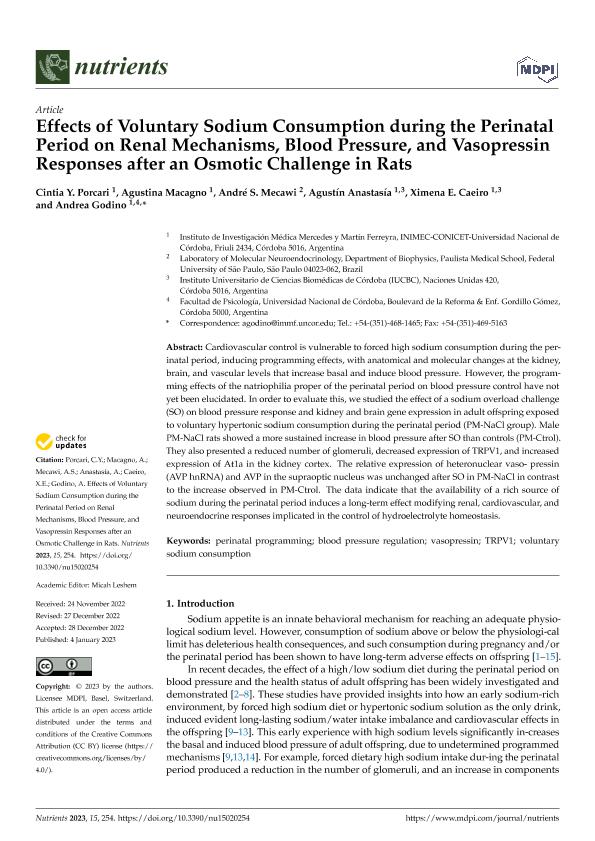Artículo
Effects of Voluntary Sodium Consumption during the Perinatal Period on Renal Mechanisms, Blood Pressure, and Vasopressin Responses after an Osmotic Challenge in Rats
Porcari, Cintia Yamila ; Macagno, Agustina; Mecawi, André S.; Anastasía, Agustín; Caeiro, Ximena Elizabeth
; Macagno, Agustina; Mecawi, André S.; Anastasía, Agustín; Caeiro, Ximena Elizabeth ; Godino, Maria Andrea del Milagro
; Godino, Maria Andrea del Milagro
 ; Macagno, Agustina; Mecawi, André S.; Anastasía, Agustín; Caeiro, Ximena Elizabeth
; Macagno, Agustina; Mecawi, André S.; Anastasía, Agustín; Caeiro, Ximena Elizabeth ; Godino, Maria Andrea del Milagro
; Godino, Maria Andrea del Milagro
Fecha de publicación:
01/2023
Editorial:
MDPI
Revista:
Nutrients
ISSN:
2072-6643
Idioma:
Inglés
Tipo de recurso:
Artículo publicado
Clasificación temática:
Resumen
Cardiovascular control is vulnerable to forced high sodium consumption during the per-inatal period, inducing programming effects, with anatomical and molecular changes at the kidney, brain, and vascular levels that increase basal and induce blood pressure. However, the program- ming effects of the natriophilia proper of the perinatal period on blood pressure control have not yet been elucidated. In order to evaluate this, we studied the effect of a sodium overload challenge (SO) on blood pressure response and kidney and brain gene expression in adult offspring exposed to voluntary hypertonic sodium consumption during the perinatal period (PM-NaCl group). Male PM-NaCl rats showed a more sustained increase in blood pressure after SO than controls (PM-Ctrol). They also presented a reduced number of glomeruli, decreased expression of TRPV1, and increased expression of At1a in the kidney cortex. The relative expression of heteronuclear vaso- pressin (AVP hnRNA) and AVP in the supraoptic nucleus was unchanged after SO in PM-NaCl in contrast to the increase observed in PM-Ctrol. The data indicate that the availability of a rich source of sodium during the perinatal period induces a long-term effect modifying renal, cardiovascular, and neuroendocrine responses implicated in the control of hydroelectrolyte homeostasis.
Archivos asociados
Licencia
Identificadores
Colecciones
Articulos(INIMEC - CONICET)
Articulos de INSTITUTO DE INV. MEDICAS MERCEDES Y MARTIN FERREYRA
Articulos de INSTITUTO DE INV. MEDICAS MERCEDES Y MARTIN FERREYRA
Citación
Porcari, Cintia Yamila; Macagno, Agustina; Mecawi, André S.; Anastasía, Agustín; Caeiro, Ximena Elizabeth; et al.; Effects of Voluntary Sodium Consumption during the Perinatal Period on Renal Mechanisms, Blood Pressure, and Vasopressin Responses after an Osmotic Challenge in Rats; MDPI; Nutrients; 15; 2; 1-2023; 1-15
Compartir
Altmétricas



